#mao zedong
Text

“We are advocates of the abolition of war, we do not want war; but war can only be abolished through war, and in order to get rid of the gun it is necessary to take up the gun.”
Mao Tse-Tung
#anti imperialism#free palestine#palestine#national liberation#mao zedong#maoism#little red book#marxism leninism#intifada
3K notes
·
View notes
Text

China
2K notes
·
View notes
Text

happy birthday, Mao Zedong! (December 26, 1893)
One of the 20th century's most influential figures, Mao Zedong was born in Hunan province to a wealthy farmer. Mao's political education began by reading the works of liberal reformer Zheng Guanying and later joined the rebellion against the Qing. Mao began associating with Chinese Marxist Li Dazhao, and soon came to embrace Marxism himself. He became an early member of the Communist Party of China and joined it in taking up arms in the name of revolution and helping to organize the Chinese Red Army. Over the course of the long Chinese Civil War, Mao's theoretical acumen, organizational skill, and tactical intelligence gained him respect and, ultimately, leadership of the party. He would lead the communists to victory against both the invading Japanese and the conservative republicans, proclaiming the People’s Republic of China in 1949. Mao set to work modernizing China and laying the foundations for socialism, instituting land reform and an industrial program while politically transforming Chinese society and suppressing reaction and liberalism. Through his leadership, China was transformed from a still semi-feudal state into a world power. Mao provided a number of contributions to Marxist theory, and his ideas are variously interpreted through such tendencies as Marxism-Leninism-Maoism and Mao Zedong Thought. He died in 1976.
"A revolution is not a dinner party, or writing an essay, or painting a picture, or doing embroidery; it cannot be so refined, so leisurely and gentle, so temperate, kind, courteous, restrained and magnanimous. A revolution is an insurrection, an act of violence by which one class overthrows another."
427 notes
·
View notes
Text

Bam Bam Bam
237 notes
·
View notes
Text
I had dinner with general Mao and all he wanted to talk about was crochet.
269 notes
·
View notes
Text

A soldier in the Al Alqsa Martyr's Brigades holds a picture of China's leader Mao Zedong.
#Maoist#Mao Zedong#Palestine#Marxism#Marxist Leninist#Chinese#mao tse tung#Palestinian#PLO#Fatah#فلسطيني#Arab#Ak47#History
173 notes
·
View notes
Text

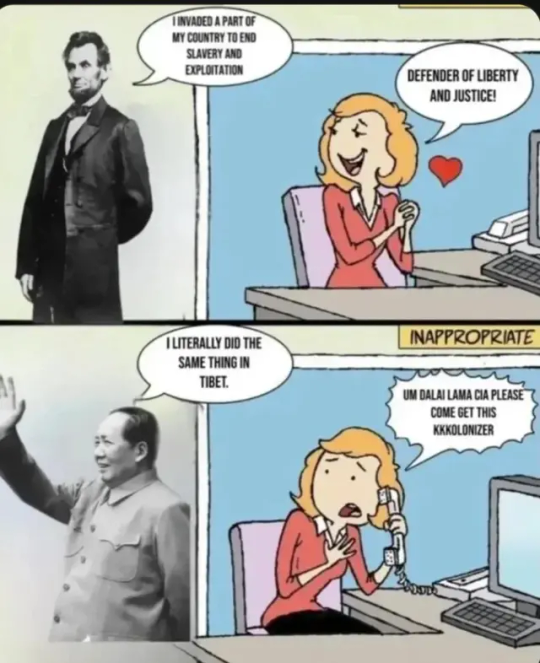

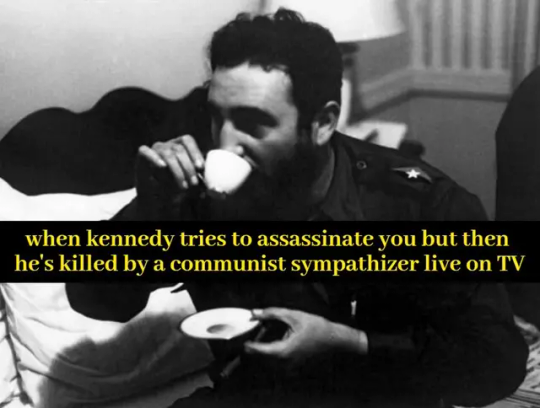
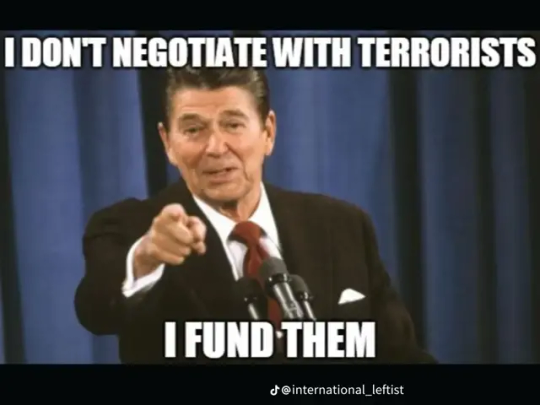


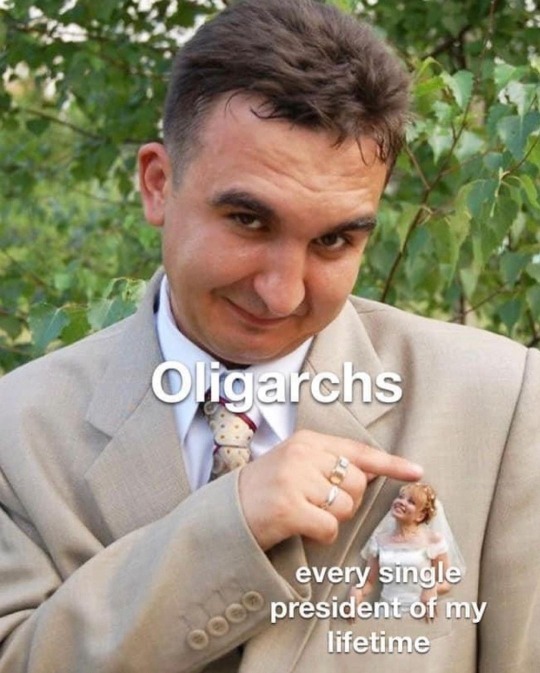

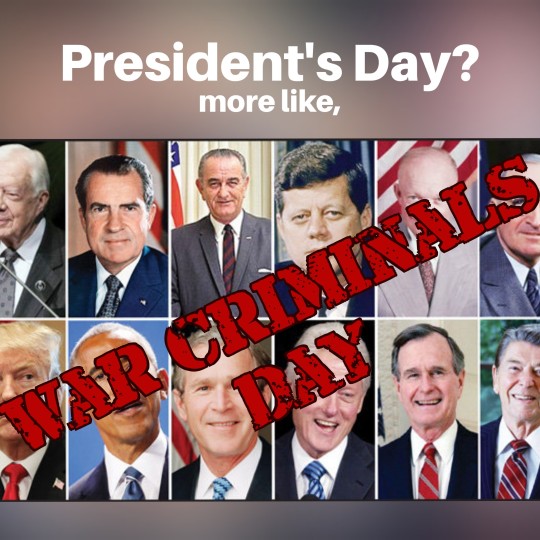
#united front#anticapitalism#meme#memes#imperialism#capitalism#united states#presidents day#george washington#abraham lincoln#ulysses s grant#woodrow wilson#john f kennedy#fidel castro#mao zedong#ronald reagan#barack obama#joe biden#oligarchy
108 notes
·
View notes
Text
Liberalism is extremely harmful in a revolutionary collective. It is a corrosive which eats away unity, undermines cohesion, causes apathy and creates dissension. It robs the revolutionary ranks of compact organization and strict discipline, prevents policies from being carried through and alienates the Party organizations from the masses which the Party leads. It is an extremely bad tendency.
Liberalism stems from petty-bourgeois selfishness, it places personal interests first and the interests of the revolution second, and this gives rise to ideological, political and organizational liberalism.
People who are liberals look upon the principles of Marxism as abstract dogma. They approve of Marxism, but are not prepared to practice it or to practice it in full; they are not prepared to replace their liberalism by Marxism. These people have their Marxism, but they have their liberalism as well--they talk Marxism but practice liberalism; they apply Marxism to others but liberalism to themselves. They keep both kinds of goods in stock and find a use for each. This is how the minds of certain people work.
Liberalism is a manifestation of opportunism and conflicts fundamentally with Marxism. It is negative and objectively has the effect of helping the enemy; that is why the enemy welcomes its preservation in our midst. Such being its nature, there should be no place for it in the ranks of the revolution.
We must use Marxism, which is positive in spirit, to overcome liberalism, which is negative. A Communist should have largeness of mind and he should be staunch and active, looking upon the interests of the revolution as his very life and subordinating his personal interests to those of the revolution; always and everywhere he should adhere to principle and wage a tireless struggle against all incorrect ideas and actions, so as to consolidate the collective life of the Party and strengthen the ties between the Party and the masses; he should be more concerned about the Party and the masses than about any private person, and more concerned about others than about himself. Only thus can he be considered a Communist.
All loyal, honest, active and upright Communists must unite to oppose the liberal tendencies shown by certain people among us, and set them on the right path. This is one of the tasks on our ideological front.
Combat Liberalism - Mao Zedong (1937)
168 notes
·
View notes
Text


Live in isometric fear, our grids and machinations will one day become alive!
ignore stretched out mao
89 notes
·
View notes
Text
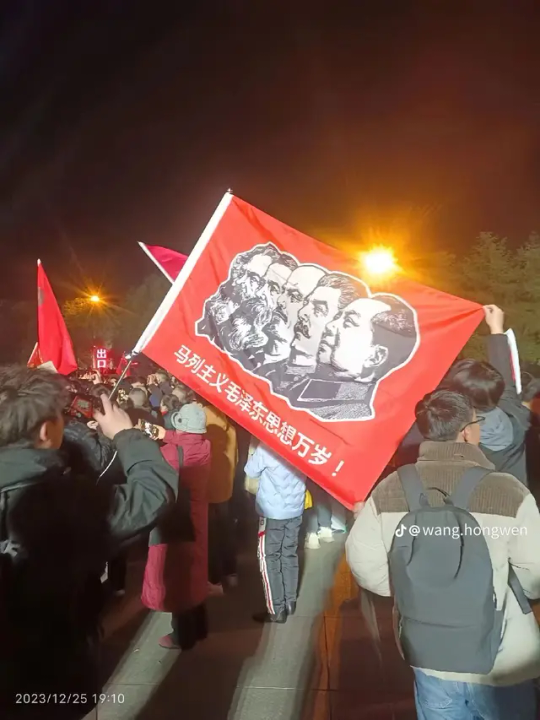
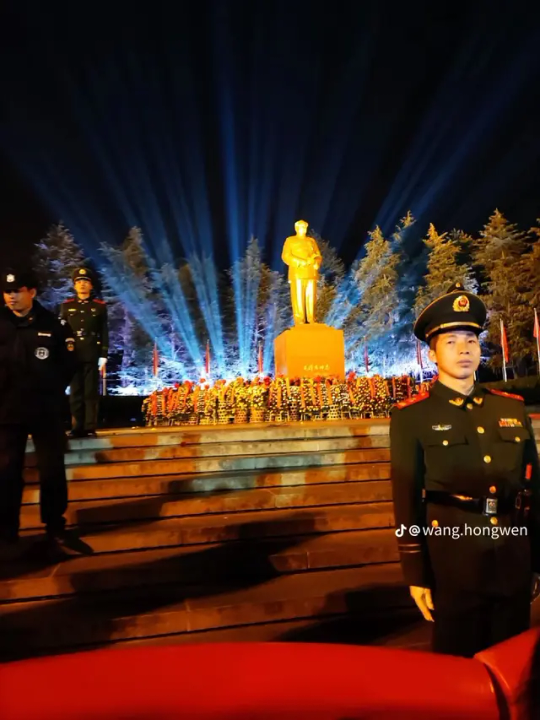
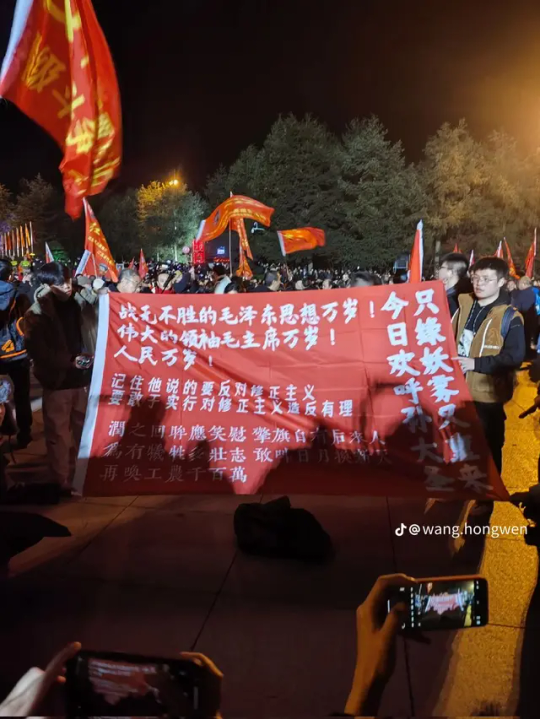

Massive crowds gathered in Shaoshan, Hunan, to celebrate the 130th birthday of Chinese Revolutionary Mao Zedong, with many younger attendees shouting slogans dating back to the Cultural Revolution such as "No crime in revolution!," "To rebel is justified!," "Down with capitalism, revisionism, and imperialism!," "Long Live Chairman Mao!" and singing, "The East is Red."
80 notes
·
View notes
Note
What flavour of communist and/or gay are you? /Gen
I'm not really sure what this means.
Not to spout clichés or take myself too seriously, but to some extent I think labels confine us within rigid structures which ultimately only serve our enemies. I know it's just a shortcut, but even the fact that you say 'flavour' kinda reiterates the idea that lots of the associated terminology positions us as existing for consumption.
Of course I know language matters. Indeed, I think a disproportionately large amount of leftist in-fighting is down to word choice and communication. More often than not, when anarchists refer to the state and Leninists refer to capital or bourgeois democracy, we're all talking about the same systems of harm and oppression. I also believe that what's most important is what we do, not how we identify.
I actively avoid the 'discourse' surrounding queer terminology. For years in my youth I railed against the word 'bisexual' because I didn't like that it implied I have two distinct sexualities, and for awhile I even called myself 'ambisexual' in an attempt to prompt a deconstruction thereof. But then I decided that I like the colours of the bi flag, which is really all that matters, because it's just aesthetics.
So I guess let me put it this way: I'm a trade union organiser who specifically represents queer union members. I grew up reading Marx, and some of the greatest influences through my adolescence on how I approach the world were Gramsci and Mao, and later Fanon and Butler. I spent a lot of my twenties questioning whether I count as trans, as I have always been very comfortable with both my masculinity and my femininity, but at some point I realised very clearly that the gender I was assigned at birth is not reflected in either.
I very strongly believe in the value of Lenin and Leninism to global struggle; but likewise I have taken a lot from Malatesta, Luxemburg, Adorno, and so on. I also think, while they are to be scrutinised rigorously, there is much to be gained from the likes of Trotsky, Foucault, or Žižek. I am a staunch anti-Zionist, but Memmi nevertheless teaches us a great deal about the plight of the colonised.
I am probably closer to an orthodox Marxist than I am to a Leninist or anarchist, but ultimately I think all this orthodoxy reeks of bourgeois affectation. The questions we should be asking are: who is most impacted by the realities of a given situation, and what are they saying, what do they need? Once upon a time in the west, and certainly still in most cases, this is BIPOC and sexual others, so we read Davis and Feinberg and Öcalan and Ahmed and Tuck and Yang. It is the strength of the revolutionary to adapt to the material conditions at hand, and remain undaunted.
In the end, we have more in common with one another than we have with ruling classes, right? So let us gather together! If this is the final struggle, let each stand in our place.
#Marxism#Antonio Gramsci#Lenin#Judith Butler#Rosa Luxemburg#Angela Davis#Leslie Feinberg#Sara Ahmed#Tuck & Yang#Marx#Karl Marx#V.I. Lenin#Mao Zedong#Mao Tse-Tung#Theodor Adorno#Errico Malatesta#Albert Memmi#Abdullah Öcalan#Eve Tuck#K. Wayne Yang#original#communism#communist#Frantz Fanon#ask
86 notes
·
View notes
Text
The Congolese struggle is vital to the global revolutionary movement and the masses in the Congo should be supported vigorously by any means available. We should never break solidarity with Congolese workers and slaves and all other exploited classes. All efforts to imperialize the Congo or continue the genocide there must be emphatically opposed. Any organization that stands for the rights of the marginalized, the workers, and human rights needs to stand in solidarity with the Congolese masses, and the ongoing attempt to wipe out this people and plunder their resources must be struggled against with all available power the workers of the world have. Solidarity with the Congolese masses! Death to the imperialists! Liberation to all peoples!
#maoism#social justice#socialist#socialism#congo#free congo#democratic republic of the congo#communist#communism#imperialism#genocide#marxism leninism#marxist#marxist leninist#marxism#karl marx#marxism leninism maoism#marxist feminism#lenin#mao zedong#struggle#black liberation#revolt#cultural revolution#rebel#natural resources#liberty#freedom#death to america#amerikkka
78 notes
·
View notes
Text
In the final analysis, victory is not decided by technology but by the determination of the people to fight and win. “Dare to struggle, Dare to win.” These words of Mao Tsetung have once again been validated in the valiant actions of the Palestinian fighters.
-Comrade Ajith, A new leap in the Palestine Liberation War
#Palestine#Mao#Maoism#MLM#communism#national liberation#palestinian struggle#Gaza#Free Palestine#Mao Zedong#victory#quote#communist#marxism leninism maoism#marxism#maoist#revolutionary#revolution#socialism
62 notes
·
View notes
Text
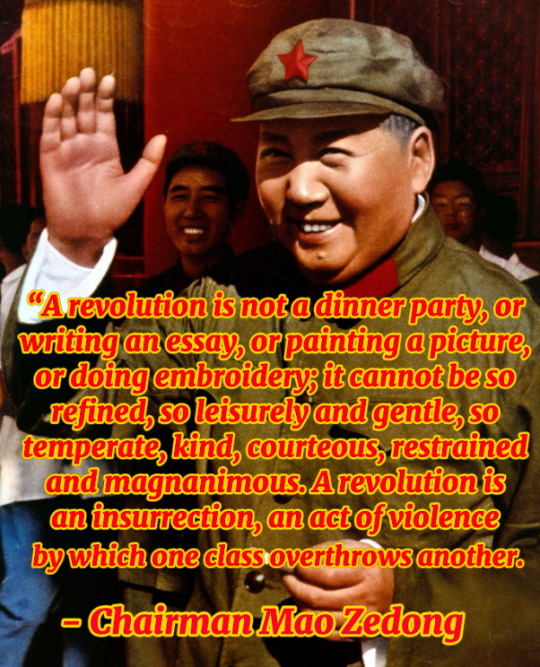
Bam Bam Bam
142 notes
·
View notes
Text
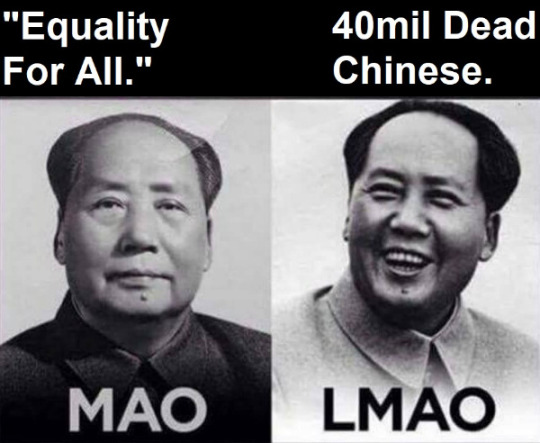
#meme#memes#shitposting#shitpost#humor#dark humor#funny memes#funny humor#funny#communism#anti communism#mao zedong#satire#irony#china
103 notes
·
View notes
Text
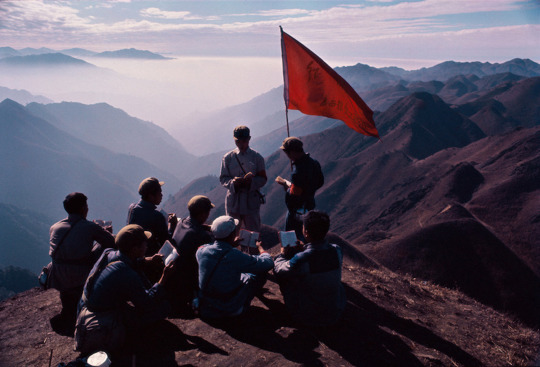
Guardas Vermelhos lendo Citações do Presidente Mao Zedong em montanha acima das Gargantes de Yangtze.
Hubei, China, 1966 / Weng Naiqiang
#Hubei#Yangtze#Rio Yangtze#Gargantas de Yangtze#Montanhas#Mao#Mao Zedong#Livro Vermelho#China#Weng Naiqiang#Guardas Vermelhos#Guarda Vermelha
223 notes
·
View notes